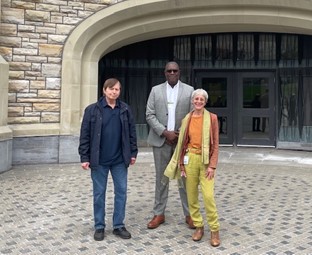On Thursday, October 6th, the Canadian Association of Professional Employees (CAPE) testified before the House of Commons Procedure and House Affairs Committee (PROC) as part of its “Review of the virtual House of Commons hybrid proceedings for the House and its committees” study.
This is CAPE’s second PROC appearance dealing with interpreters since its last in April 2020. CAPE stressed again the need for the PROC to keep interpreters’ health and safety front and center as it decides the way forward for parliamentary sittings.
Speaking on behalf of federal interpreters represented by CAPE, André Picotte, acting president, provided a review of all attempts sought to bring resolve to the ongoing challenges to interpreters’ health and safety challenges since Parliament began hybrid sittings at the start of the 2020 pandemic.
Notably mentioned were written briefs to the House of Commons Board of Internal Economy, the Standing Committee on Official Languages and a formal complaint against the Translation Bureau to the Labour Program of Employment and Social Development Canada.
Mr. Picotte stated that “in-person meetings provide the best sound with the least amount of strain,” yet acknowledging that hybrid committee meetings and sittings are here to stay, hence the necessity to mitigate their consequences on interpreters’ health, and their ability to go on working in their field.
CAPE reiterated critical health and safety measures to enforce, such as:
- Improving the sound quality provided by the House audio-visual system.
- Making sure that remote participants meet basic technical requirements.
View the recording for the PROC hearing
Mr. Picotte was accompanied by Paule Antonelli, CAPE Local 900 Acting President and interpreters' representative who responded to questions from PROC members.
Ms. Antonelli expanded upon interpreters’ physical suffering, such as tinnitus and hypersensitivity to noise because of excessive exposure to toxic sound. She stated that the use of the cellphone was often a culprit in delivering poor sound quality and a common source of eardrum injury.
Dina Epale, Senior Advocacy and Public Affairs Advisor joined the CAPE delegation. Mr. Epale has been overseeing government collaboration in the interpreters’ file since 2020.
As part of this study, the PROC met with several witnesses including the International Association of Conference Interpreters - Canada and the Translation Bureau and CAPE expects them to include its recommendations in their report to Parliament.
Media articles:
- CBC News - Posted: Oct. 09, 2022 - The hybrid model of Parliament is once again under the microscope. Is it here to stay?



